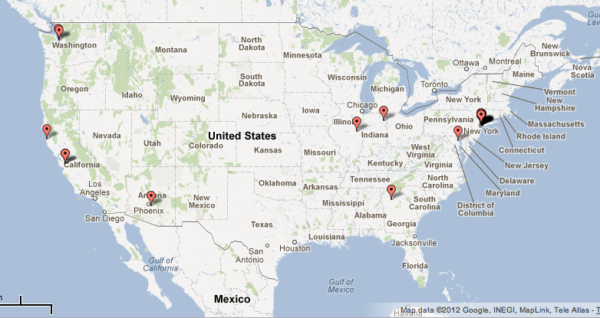Today I received an email from the Invisible Children project announcing the capture of a Commander of the LRA. They have been diligent to send updates to those interested in their campagne to end the Lord’s Resistance Army, which is a mobile one, by dismantling the leadership of Joseph Kony.
One of the (many) tension points surrounding the LRA/KONY2012 movement has sprouted from the mere fact that it was piloted by a white guy from Southern California. Others contend the use of funds raised (which was addressed through publishing complete financials on their website) or the accuracy of their information regarding Kony (which they attempted to clarify through the release of additional, more detailed, videos through youtube), but the proverbial ‘bone’ over race and geography is – right out of the gate – one that the org is disinterested in. They claim that their focus is based in the ideal that individuals should concern themselves with injustice anywhere and toward anyone, they also have attempted to display their partnerships with local civilians, military, and organizations in order to dispel the idea that they were charging in on a lone ‘white’ horse.
Jumping back in time to my recent (reactionary) post on ‘Hipster Racism’, I was able to collect some data from my social network. Here is my follow up to that short study:
98% surveyed said that Racism DOES exist today, with 82% observing traces within their generational peers. 7% claim no personal racist attitudes, while 68% claim that everyone has the potential to be.
Although 96% associate racism with prior generations, 70% still observe it in their personal life experiences. The pole surveyed those from “Mexican, Mexican American, Chicano, Cuban” decent, “White/Caucasian”, “Black or African American”, “Japanese”, “Chinese”, “Korean”, “Filipino”, and “Other Asian” individuals.
The majority of those surveyed were 26-45 years old (81%) and 77% were female. A combined 85% hold an Undergraduate or Masters degree.
I got some great feedback and comments including that I did not provide a “Multi-racial” option in the survey (I just used a US census list which I had found elsewhere) a good thing to note for future conversations! Here are some other observations:
“In my experience racism is found between and within minority groups as often as it is found coming from the majority group. Some call it reverse racism. I think it is just human insecurity, exhibiting itself in any group that feels more powerful when it marginalizes others.”
“I’m very conscious of doing my best to never say anything that may offend my friends of other races, [but] i can’t tell you how many times in my 26 years i’ve been called [racist names].”
“Despite it being 2012, I find that race is a particularly sensitive subject. I think that many people, because of specific historic events (Holocaust, Segregation, Slavery, genocides throughout the world), people feel uncomfortable talking about race, giving it a negative connotation. I understand race as simply a way of describing your genealogical heritage, and less as an indicator for the type of person you are; however, I feel that most people believe the latter.”
“I think our generation’s views on race are changing for the better. Technology especially is allowing for more cross racial and cross cultural dialogue.”
Well, it looks like we aren’t actually post-race, but it also seems that it is not primarily an attitude from any one group, but that it may spring from any number of individual experiences or even insecurities. I would love to keep this conversation open, if you care to comment below.
As for the group of Southern Californians who founded Invisible Children, I may not agree with all of their tactics, but I think they are on to something when it comes to a global empathy and activism for the just treatment of people – without regard to nationality or geography.

